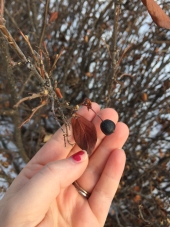



Crt Jakhel wrote:Well, black locust honey is definitely very mild, from what I've experienced so far it's not very different in taste from clover.
Canola gives a kind of honey that crystallizes super quickly and has a distinct note kind of like... uh... cabbageIt *is* the same plant family after all.
Don't go ordering a large number of black locust trees unless you can get them on the cheap. If locust likes your land it will multiply quickly on its own.
I'm sorry that I can't name specific cultivars of buckwheat that would work fine for honey in Canada / USA - I'm in continental Europe and I've noticed that for many widely cultivated plants, from fruit trees to grains, the set of available varieties can be quite different than in the English-speaking countries. But if it so happens that you can get the buckwheat called Bamby (it's an Austrian one), go for it. Again, your set of what's available may be completely different than mine.
Note that in any case buckwheat is very picky about air humidity and will only attract bees if the humidity is at about 75% or more. This usually means only a few hours after the sun rises in the summer and if your summer months are droughty, you might not get a result at all. It happens - we had a great buckwheat honey crop in 2016 but none in 2017. But it's worth cultivating anyway because even if there's no honey, there's still the beneficial effect for the soil.
You also asked about the beneficial effect of herbal oils that the bees come into contact with as they visit the flowers. There is a beneficial effect but as I understand it this is also still a developing story, an area of ongoing research. There are for example anti-varroa products in the EU market that are based on thymol - the main active ingredient of thyme oil. Reports vary a lot on how effective this is. In my not exactly abundant experience - 2018 will be my 6th beekeeping season - general properties of a given year such as a prolonged hot and dry period in the summer or lack thereof have a strong influence on bee health. Add into that what kind of forage was available during the year and at what time - and already you have variables that can be more important than some individual measures that you've taken against varroa.
The linden tree is a good choice for bees as well. Just beware of the heavy shade that it can cast -- not like the soft filtered shade from black locust.
Linden honey has a minty (mentholic) flavor. Can't say what mint honey tastes like thought because I've never encountered such a quantity of mint growing in one place that it would dominate in the nectar the bees bring home.
You might want to consider maple trees, too. They give good forage quite early in the year. And hazel bushes for the same reason, the nuts are a bonus. Pussy willow for wet spots.
From what you've already described I would say your beekeeper is bringing the bees to a little piece of heaven... Make sure he gives you some good honey in return



Stacy Witscher wrote:My only experience with corn salad (mache) here in the US in the restaurant industry. And it's all grown hydroponically, rots before your eyes. I always loved the flavor, but it was extremely expensive. I would love to be able to grow some. Going to follow this thread. Thanks.

Inge Leonora-den Ouden wrote:Nice to have so many new recipes for squash or pumpkin! I have only one species, the orange Japanese pumpkin type. That's the one that grows best in my region. This year I had some 'volunteer' plants, coming from seeds hided in the compost. The plants climbed up to about 6 ft (together with the kiwi plant). This pumpkin grew high up there!

David Livingston wrote:Borage Sage and thyme are big favourrates of my bees not sure if they are any use as a cover crop

David
 We are growing tons of herbs. The three you mentioned as well as hyssop, savory, oregano, lavender, chives, lemon balm, monarda, elecampane, and several more.
We are growing tons of herbs. The three you mentioned as well as hyssop, savory, oregano, lavender, chives, lemon balm, monarda, elecampane, and several more.

Todd Parr wrote:Mint is a great one. Very inexpensive to get going, spreads well, and the honeybees love it.

Todd Parr wrote:I'm wondering more and more if planting cover crops is really necessary at all. I'm not certain how much advantage there over just letting weeds grow as my cover crops. When I'm ready to plant, I can mow them down, layer on mulch and make holes or rows to plant in. Even if weeds don't fix nitrogen, they contain it and will release it to be used after I chop and drop them right?